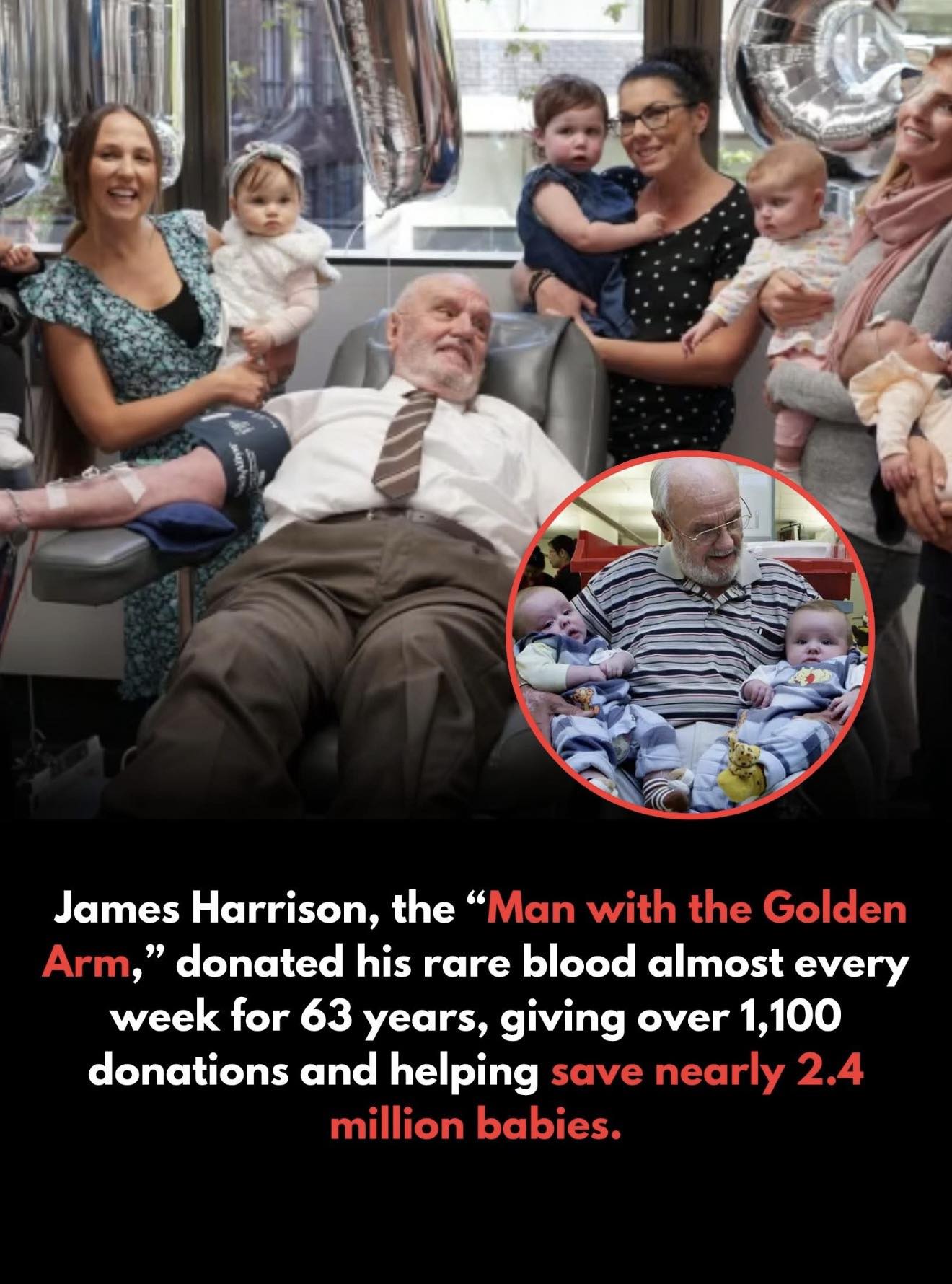A Hero Whose Blood Saved Generations
James Harrison was no ordinary man. Known across Australia as “The Man with the Golden Arm,” his rare blood plasma became one of the most extraordinary medical miracles in history — a gift that saved more than 2.4 million newborn babies.
His story began not in a laboratory or hospital, but in a hospital bed — where a 14-year-old boy received a life-saving blood transfusion that would change his destiny forever.
In 1951, young James underwent major chest surgery that required 13 liters of donated blood. As he recovered, he made a vow — that when he was old enough, he would give back by donating his own blood to help others. What he didn’t know was that his future donations would go on to transform medicine and save millions of lives across generations.
A Promise That Saved Millions
When James turned 18, he kept his promise and began donating blood regularly. But a few years later, doctors made a stunning discovery — his blood contained a unique antibody that could be used to develop a life-saving treatment for Rhesus disease (Rh incompatibility).
This condition occurs when a pregnant woman with Rh-negative blood carries a baby with Rh-positive blood, inherited from the father. The mother’s immune system can mistakenly attack the baby’s red blood cells, leading to stillbirths or life-threatening anemia in newborns.
At the time, thousands of babies in Australia were dying each year from this disease. But thanks to the antibodies found in James’s plasma, researchers were able to create the Anti-D injection — a revolutionary treatment that prevents these tragic deaths.
The Birth of the Anti-D Injection
By donating plasma every few weeks, James became a critical part of Australia’s public health system. Each donation was processed to extract the antibodies used in the Anti-D serum. This injection was given to Rh-negative mothers during pregnancy to prevent complications.
James’s contribution quickly became known as a medical breakthrough. It wasn’t long before every Anti-D injection administered in Australia contained antibodies derived from his plasma.
For over six decades, James donated blood more than 1,100 times — roughly once every two to three weeks for 63 years. His donations are estimated to have saved over 2.4 million babies, not only in Australia but worldwide, as the treatment spread globally.
The Man Behind the Miracle
Despite his fame, James remained remarkably humble. He often said, “It’s the least I can do. Someone helped me when I needed it — now it’s my turn.”
He never considered himself a hero, though the world saw him as one. He simply viewed his blood donations as a way of giving back — a quiet, steady act of kindness that grew into something unimaginable.
His generosity didn’t just save lives; it gave countless parents the gift of holding their children in their arms — a gift that can never be measured.
In 1999, James was awarded the Medal of the Order of Australia, one of the nation’s highest honors, for his selfless contributions to medicine and humanity. But even with national recognition, he continued to donate, week after week, year after year.
Retirement and a Lasting Legacy
In 2018, at the age of 81, James Harrison made his final donation. Australian law prohibits blood donations from individuals over a certain age due to health precautions, but even on his last day, James arrived smiling.
“It’s a sad day, but I’m proud of what I’ve done,” he said in an interview. “I’d keep going if they’d let me.”
Medical staff and families who had benefited from his plasma gathered to honor him — some holding babies who wouldn’t have been alive without his golden arm.
Though he could no longer donate, his impact lived on through the countless mothers and children who survived because of his rare gift.
Farewell to a Legend
On February 17, 2025, James Harrison passed away peacefully in his sleep at the age of 88. Tributes poured in from across the world, celebrating a man whose quiet generosity shaped medical history.
Hospitals, doctors, and millions of families expressed their gratitude online, many sharing stories of how their children were alive because of the Anti-D injection.
Australia’s Red Cross called him “a true national treasure,” while others described him as “a man who gave life to strangers he never met.”
Even in death, his blood continues to save lives — because the antibodies developed from his plasma remain in ongoing medical production, ensuring that his life-saving legacy will endure for generations to come.
A Legacy of Humanity and Hope
James Harrison’s story isn’t just one of medical science — it’s a story of empathy, humanity, and how one person’s promise can ripple across decades.
He could have easily lived his life in quiet gratitude after surviving his own surgery, but he chose to dedicate his existence to saving others. It’s a powerful reminder that even the simplest act of giving — in this case, blood — can create miracles beyond imagination.
Every Anti-D injection given to a mother is more than a medical treatment. It’s a reflection of James Harrison’s heart — a symbol of compassion that lives on through every baby who takes their first breath because of him.
Remembering “The Man with the Golden Arm”
Today, James’s story is taught in schools and medical institutions around the world. He stands as a shining example of how one person’s kindness can alter the course of history.
The man with the golden arm may have passed, but the golden legacy he left behind continues to beat in millions of hearts — a legacy written not in words, but in life itself.

